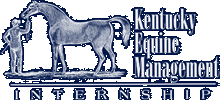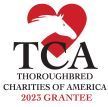The internship is a 22-24 week commitment that is physically, mentally and emotionally challenging. During the first week, interns participate in orientation activities as a group. The orientation is designed to acquaint students with the expectations of the KEMI program, job opportunities for graduates and to provide a general overview of the components of the Kentucky thoroughbred industry. Participation in the orientation short course is required for all KEMI participants. The short course includes lectures from industry professionals on current topics affecting the management and breeding or thoroughbreds as well as field trips to farms to observe stallion, broodmare, yearling and training operations.
On the weekend prior to the orientation short course, there is an opportunity for students and families to meet the KEMI Board of Directors, Coordinator and previously enrolled students to better acquaint new interns with the conditions of the program and farm employment.
After the first week, interns are employed by participating farms as full-time employees where they become familiar with the day-to-day operations of commercial thoroughbred farms. On area farms, a full-time work week is 48 hours per week with one day off. The participating farm will determine individual responsibilities for each intern based on farm needs and the qualifications of the intern. In most cases, students work hands-on with horses, however some farms may also assign responsibilities associated with record keeping, veterinary care or farm maintenance.
Students are required to work for their farm or host-site at least full-time (> 40 hours each week) during the entire course of the internship. However, most students work approximately 48 hours per week. On most farms the regular work days start early, usually at 7:00 AM. Most students will work 8 hours/day, 6 days a week. However, some farms may have slightly different work hours or requirements. All interns should expect to devote a large portion of their daily workday to routine barn chores and horse care.
The spring KEMI session (which begins in January) provides students with an overview of the intensive management practices used on commercial thoroughbred breeding operations. On a day-to-day basis, most students will be involved in the care of pregnant and foaling mares. Some farms may require students to participate in “foal watch” rotations and/or to help with neonatal care during evenings and nights. As students become more experienced they may be expected to take mares to breeding sheds, assist with veterinary care or perform some record keeping. There are some farms that provide opportunities for students to gain experience with stallions.
During the fall session (which begins in mid-June), most students will be placed with farms that prepare horses for commercial auctions. There are major thoroughbred sales almost monthly beginning in July. Students gain experience in the techniques for preparing yearlings, weanlings and broodmares for sale and have the opportunity to learn about the factors that affect the value of an individual horse including pedigree, conformation and soundness. Students working for farms with sales horses should expect to work extended hours during the sale. A few host sites offer opportunities to work with horses under saddle; however, these opportunities are limited and students must meet strict criteria for riding ability and height/weight restrictions.
To gain the most experience from the internship, students are encouraged to spend additional hours shadowing a professional in their field of interest (veterinarian, accountant, farrier, bloodstock agent). Occasionally farms may allow KEMI students to spend part of a regular work day shadowing a horse industry professional. However in most cases, the intern must arrange for these activities on their day off. The KEMI coordinator can help students arrange additional learning experiences on their day off.
The Classroom Component: Farm employment gives students an understanding of what is done and when it’s done on a commercial thoroughbred farm. The classroom component provides an understanding of why various management practices are used. Students meet at least one evening a week for an educational lecture, demonstration or field trip. Attendance at these weekly activities is required. The lectures, demonstrations and field trips seek a balance between veterinary/health related topics and current industry issues. These learning experiences are provided by successful veterinarians, bloodstock agents, farm managers, communications experts, university researchers and other industry professionals. In the Spring session topics focus on breeding and foaling. Example lectures include: managing dystocia in the mare, corrective trimming for conformation defects in foals, use of surgical procedures to correct angular limb defects in foals, controlling disease outbreaks on farms, feeding broodmares for optimal reproductive efficiency, infertility in mares and stallions, etc. In the Fall Session, topics focus on preparation of young horses for sales and racing. Example topics include: pedigree considerations in selecting racing prospects, use of acupuncture in the thoroughbred industry, promoting racing in the US, relationship of conformation to soundness in thoroughbreds, buying and selling young horses for profit, breeding horses for commercial sale, etc. One evening a month students attend a meeting of the Kentucky Thoroughbred Farm Managers Club where they listen to an invited speaker and have the opportunity to interact with active farm managers and others in the related industries. Other activities may be scheduled during each session at the discretion of the coordinator.
In addition to attending the regular weekly evening meetings, students are required to complete homework and other assignments and to compile a portfolio that details their internship. All work is graded by the KEMI coordinator and used, in conjunction with the employer’s evaluation to determine whether an intern receives a certificate of completion for the KEMI course.

